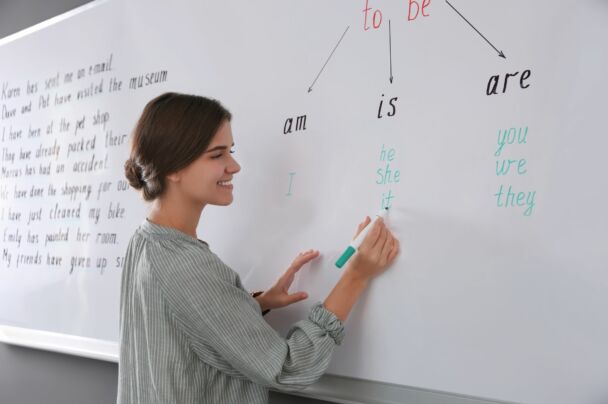Description
Targeted to A1 speakers. Read more »
At the A1 CEFR level, learners focus on acquiring basic language skills. They can understand and use simple expressions to meet immediate needs, introduce themselves, ask basic questions, and engage in simple interactions.
Many teachers (and school staff) believe they have too many low-level English skills to take Erasmus+ courses abroad. This is incorrect.
All teachers can take Erasmus+ courses abroad. Everyone will learn something (growth mindset!) although not everyone will learn the same thing!
For some, practicing their English will be enough for them to join Erasmus+ Mobility!
This course will allow participants with low-level English skills to travel abroad and take part in international mobility like their colleagues more advanced in English.
The course is structured specifically for school teachers, school staff, and educators with limited English competency so that they can also discover the spirit of Erasmus+.
The facilitator of the course will be a teacher of English (or foreign languages) used to learners with low English skills. Every day, she or he will propose simple activities to engage participants in conversation and to have them interact with each other.
Participants will introduce themselves, talk about their school and their country, and exemplify their culture with concrete and digital examples.
They will also take part in outdoor cultural activities to learn about the city and region and discover the astonishing beauty of European Cultural Heritage.
By the end of the course, participants will feel more confident in speaking and listening to a conversation in English.
They will be familiar with the spirit of Erasmus+ and feel ready to profit from the many opportunities the program offers to school and school teachers.
What is included
Learning outcomes
As to professional skills, the course will focus on the English capacities of the participants (which is already a very important professional goal).
On the other hand, the course will deeply engage all the other objectives of Erasmus+ mobility:
- Promoting values of inclusion and diversity, tolerance, and democratic participation;
- Promoting knowledge about shared European heritage and diversity;
- Promoting examples of teaching activities for non-formal and informal learning;
- Supporting the creation of social bonds among school teachers in Europe;
- Promoting the inclusion of professionals with low-English skills in national and international networks;
- Supporting the personal development of teachers, school leaders, and other school staff;
- Improving language learning and language diversity in schools;
- Building the capacity of schools to engage in cross-border exchanges and cooperation, and carry out high-quality mobility projects.
Tentative schedule
Day 1 – Introduction to the course
- Introduction to the course, the school, and the external week activities;
- Icebreaker activities;
- Presentations of the participants’ schools.
Let’s meet together
- Class Activity: Who am I?
- Class Activity: Cultures and languages in Europe.
Day 2 – Let’s eat together
- Class Activity: What do you eat at home?
- Outdoor activity: Discover the local food culture.
Day 3 – Let’s visit the city!
- Class Activity: The city and the surroundings;
- Class Activity: Discover local culture;
- Outdoor activity: Art in town.
Day 4 – Let’s go digital
- Class Activity: Simple ICT tools for school teachers;
- Class Activity: Discover my country from my mobile phone.
Day 5 – Let’s travel to Europe
- Class Activity:What is Erasmus+? Opportunities for your school;
- Class Activity: Plan your next mobility!
Day 6 – Course closure and cultural activities
- Course evaluation: round-up of acquired competencies, feedback, and discussion.
- Awarding of the course Certificate of Attendance.
- Excursion and other external cultural activities.





